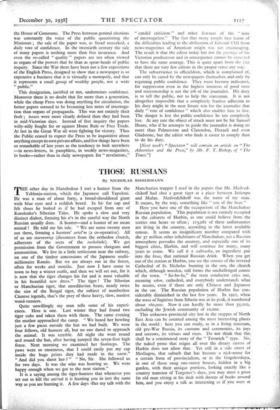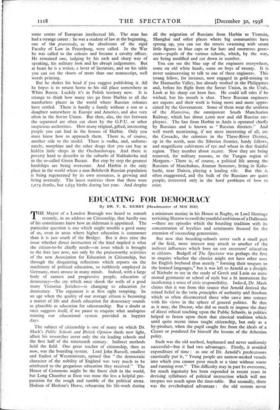THOSE RUSSIANS
By NICHOLAS SISSERMANN
THE other day in Manchukuo I met a hunter from the Yablonja-station, which the Japanese call Yapuloni. He was a man of about forty, a broad-shouldered giant with blue eyes and a reddish beard. In his fur cap and felt shoes he looked as if he had escaped from one of Korolenko's Siberian Tales. He spoke a slow and very distinct dialect, forming his o's in the careful way the North Russian usually does. A hunter—and a hunter of no mean animal I He told me his tale. "We are some twenty men out there, forming a hunters' artel'm (a co-operative). All of us are starovertsy (dissenters from the orthodox church, adherents of the sects of the raskolniki). We get permission from the Government to possess shotguns and ammunition. We live in a little settlement near the railway, on one of the timber concessions of the Japanese multi- millionaire Kondo. But we are always out in the forest, often for weeks and months. Just now I have come to town to buy a winter outfit, and then we will set out, for it is now that the tiger changes his fur and is most valuable in his beautiful new dress." The tiger ! The Siberian or Manchurian tiger, that antediluvian beast, nearly twice the size of the Bengal tiger, the subject of numberless Chinese legends, that's the prey of these heavy, slow, modest wood-runners.
Quite unwillingly my man tells some of his experi- ences. Here is one. Last winter they had found two tiger cubs and taken them with them. The same evening the mother approached the camp. "We heard her howling just a few paces outside the hut we had built. We were four fellows, old hunters all, but no one dared to approach the animal It was terrible. All night she went round and round the hut, after having jumped the seven-foot high fence. Next morning we examined her footsteps. The paws were so enormous, that I could easily put my cap inside the huge prints they had made in the snow." "And did you shoot her ? " "No, Sir. She followed us for two days. It was she who was hunting us. We were happy enough when we got to the next station." It is a saying among the tiger-hunters that whenever you set out to kill the animal it is hunting you in just the same way as you are hunting it. A few days .^.fter my talk with the Manchurian trapper I read in the papers that Mr. Medved- chikoff had shot a great tiger at a place between Imienpo and Mulan. Medvedchikoff was the name of my man. It means, by the way, something like "son of the bear."
Here you have one of the occupations of the Manchukuo Russian population. This population is not entirely occupied in the cabarets of Harbin, as one could believe from the stories one hears so often ; 113,081 of these unfortunates are living in the country, according to the latest available census. It seems an insignificant number compared with the 37 million other inhabitants of Manchukuo, yet a Russian atmosphere pervades the country, and especially one of its biggest cities, Harbin, and will continue for many, many years to come. We call it a zakvaska, an ingredient put into the kvas, that national Russian drink. When you get out of the station at Harbin, you see the crosses of the revered Cathedral of St. Nicholas burning in the sun, the church which, although wooden, still forms the unchallenged centre of the town. " So-be-lu," the tram conductor cries out, meaning sobor, cathedral, and everybody understands what he means, even if there are only Chinese and Japanese in the -car. The Russian population of Harbin has con- siderably diminished in the last few years. In 1922, when the wave of fugitives from Siberia was at its peak, it numbered about i6o,000. Now it can hardly be more than 35,000, excluding the Jewish community of 10,000.
This unknown provincial city lost in the steppes of North East Asia can be counted among the most interesting places in the world : here you can study, as in a living museum, old pre-War Russia, its customs and ceremonies, its joys and sorrows, its virtues and vices. Do not think that this shall be a sentimental story of the " Tovarich " type. No, the naked prose that reigns all over the dreary streets of Harbin does not allow that. Yet still in a side street of Modiagou, that suburb that has become a nick-name for a certain form of provincialism, or in the Gogolevskaya, in one of those snug one-storey houses, hidden in a big garden, with their antique porticos, looking exactly like a country mansion of Turgenev's days, you may meet a great fat old man sitting at his desk with dozens of books around him, and you enjoy a talk as interesting as if you were at some centre of European intellectual life. The man has had a strange career : he was a student of law at the beginning, one of the pravovedy, as the absolvents of the rigid Faculty of Law in Petersburg, were called. In the War he was called to the colours and became a cavalry officer. He remained one, judging by his rash and sharp way of speaking, his military look and his abrupt judgements. But at heart he is a writer, a lover of literature, and on his table you can see the sheets of more than one manuscript, well worth printing.
But he shakes his head if you suggest publishing it. All he hopes is to return home to his old place somewhere in White Russia. Luckily it's in Polish territory now. It is strange to think how many ties go from Harbin to all the numberless places in the world where Russian colonies have settled. There is hardly a family without a son or a daughter somewhere in Europe and America, and also very often in the Soviet Union. But then, alas, the ties between the separated are often cut short by the G.P.U. or other suspicious authorities. How many original, gifted, interesting people you can find in the houses of Harbin. Only you must know how to approach them. There is, of course, another side to the medal. There is vodka, and, unfortu- nately, morphine and the other drugs that you can buy at hidden little shops in the Ouchatskovaya. And there is poverty hard to describe in the suburbs of Nakhalovka and in the so-called Green Bazaar. But step by step the greatest hardships are being overcome. And Harbin is the only place in the world where a non-Bolshevik Russian population is being regenerated by its own resources, is growing and living normally. The latest statistics show that there were 1,074 deaths, but 1,635 births during last year. And despite dl the migration of Russians from Harbin to Tientsin, Shanghai and other places where big communities have sprung up, you can see the streets swarming with smart little figures in blue caps or fur hats and enormous great- coats—pupils of the various schools, which, by the way, are being modified and cut down in number.
You can see the blue cap of the engineers everywhere, some on old white heads, some on boys of twenty. It is never uninteresting to talk to one of these engineers. This young fellow, for instance, now engaged in gold-mining in the Humaerho Valley, has already worked in the Philippines and, before his flight from the Soviet Union, in the Urals. Look at his sharp cut keen face. He could tell tales if he wished, but his mouth is shut. These Russian engineers are experts and their work is being more and more appre- ciated by the Government. Some of them wear the uniform of the Mantettsu, the omnipotent South • Manchurian Railway, which has about 2,000 new and old Russian em- ployees. The line from Harbin to Anda is operated chiefly by Russians and is known as "Russian districts." And well worth mentioning, if not most interesting of all, are the Cossacks, the colonists in the Three-River District, up in the north, near- the Siberian frontier, hardy fellows, and magnificent cultivators of rye and wheat in that fruitful region. They number about io,000. Now they are being removed, for military reasons, to the Tungus region of Merguen. • There is, of course, a political life among the Russians of Manchukuo, Ataman Semenov, living in Kaka- hashi, near Dairen, playing a leading role. But this is often exaggerated, and the bulk of the Russians are quiet people, interested only in the hard problems of how to exist.



































 Previous page
Previous page